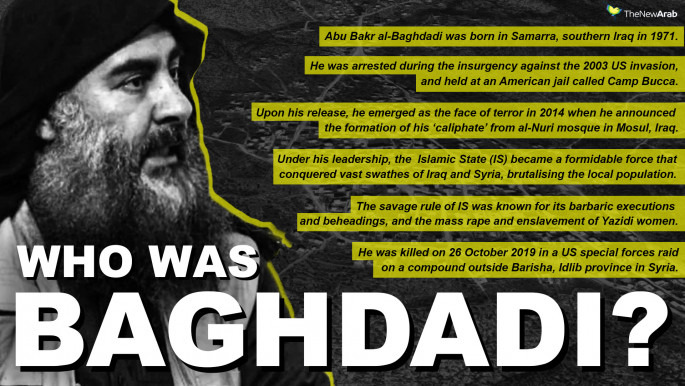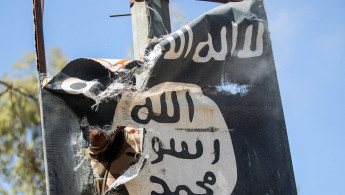Islamic State used Turkish offensive in Syria to 'regroup', US says after controversial troop withdrawal
President Donald Trump said on October 6 around 1,000 US troops were leaving northeast Syria, where they had kept an uneasy peace between neighbouring Turkey and Syrian Kurdish fighters.
Trump's move allowed an incursion by Turkey aimed at destroying Kurdish guerrillas, who had led the fight against the Islamic State group and run jails for captured extremists in their effectively autonomous area in northern Syria.
Trump, who was strongly criticised even by allies in his own camp, has changed course several times, eventually announcing that a residual force would remain in Syria to protect oil fields.
"ISIS exploited the Turkish incursion and subsequent drawdown of US troops to reconstitute capabilities and resources within Syria and strengthen its ability to plan attacks abroad," the Department of Defence Office of Inspector General said in a report, using a common acronym for the IS group.
The office, which is an independent investigative arm, added that IS "will likely have the 'time and space' to target the West and provide support to its 19 global branches and networks," the report said, citing information provided by the Defence Intelligence Agency (DIA).
In the long run, it "will probably seek to regain control of some Syrian population centres and expand its global footprint," the inspector general added, citing the DIA.
Read more: Baghdadi's wife revealed IS group secrets after capture
Meanwhile, the death of IS leader Abu Bakr al-Baghdadi, who was killed during a raid conducted by US special operations forces in Syria on October 26 "would likely have little effect on ISIS's ability to reconstitute," the DIA said, according to the report.
Already IS has "has activated sleeper cells to increase attacks" against the Kurdish-led fighters of the Syrian Democratic Forces, whom the United States relied upon in the fight against IS.
In 2014 fighters from the newly formed IS group swept through much of the Sunni heartland in Iraq and Syria to declare a "caliphate."
 |
The report states that US forces in Syria continue to arm SDF fighters but have stopped training them. By the end of the third quarter, the SDF had 100,000 fighters, according to the document.
Take back foreign fighters
Tuesday’s report came just days after Secretary of State Mike Pompeo said European and other members of the international coalition fighting the Islamic State group must take back and prosecute their nationals detained in Iraq and Syria to help keep IS from regaining territory.
Pompeo told foreign ministers and senior officials from some 30 coalition members that it's imperative that they hold thousands of detained foreign fighters accountable for atrocities committed while IS held swaths of territory in the two countries.
Many of the detained foreign fighters are from Europe, but countries have been reluctant to take them back and officials acknowledged there are still differences of opinion among coalition partners about how best to deal with them.
The meeting came amid concerns about the US commitment to the fight against IS remnants. Those concerns have increased as President Donald Trump has pressed to withdraw American troops from Syria.
It was also the first meeting at such a senior level since IS was driven from the last of its major strongholds in March and the first since the group's leader, Abu Bakr al-Baghdadi, killed himself during a US raid last month.
Pompeo said bringing the foreign fighters to justice in their home countries is critical to preventing IS from resurrecting its caliphate and exporting its ideology.
"That work begins with carrying out justice against those who deserve it," he said. "Coalition members must take back the thousands of foreign terrorist fighters in custody and impose accountability for the atrocities they have perpetrated."
NATO Secretary General Jens Stoltenberg said coalition members need "more coordinated efforts" to resolve the issue of foreign fighters and must also train more local forces to prevent a resurgence of the Islamic State.
"If you can enable local forces to fight terrorism themselves, to stabilize the country, ... that's in the long run the best way to also fight terrorism," he said in an Associated Press interview after the meeting.
Nathan Sales, the director of the State Department's counterterrorism bureau, said the US rejected suggestions such as asking countries in the region to accept them or establishing an international tribunal to try them.
"Each country has a responsibility to handle this situation on their own," he said. "Our view is that it's not a viable option to ask other countries in the region to import another country’s foreign fighter and pursue prosecution and incarceration there."
Pompeo also dismissed concerns about America's commitment and said the US would continue to lead the coalition. He noted that US forces had killed Baghdadi and his deputy.
"Ask them if there's a deficit of American leadership in fighting ISIS," he said, referring to the militant group by one of its other names and pointing out that the US still has forces in Syria despite the recent Turkish invasion.
Those troops, he said, will allow the US to retain the ability to launch airstrikes on IS targets and protect oil fields that the militants had once used to bring in significant revenue.
Pompeo also urged coalition participants to step up funding for UN relief and reconstruction projects in Iraq and Syria to allow for the return of millions of civilians displaced by years of conflict.
As the effort in Iraq and Syria goes on, Pompeo said it will also be critical to keep IS from expanding its reach to other areas, notably the Sahel region in west Africa where he said the group "is outpacing the ability of regional governments and international partners to address the threat."
"The fight against ISIS is a long-term test of will, a test of civilisation against barbarism,” he said. "We know where we stand. Let's work together to make sure our enemy does too."
Follow us on Twitter and Instagram to stay connected





 Follow the Middle East's top stories in English at The New Arab on Google News
Follow the Middle East's top stories in English at The New Arab on Google News
![Israeli forces ordered bombed Gaza's Jabalia, ordering residents to leave [Getty]](/sites/default/files/styles/image_330x185/public/2176418030.jpeg?h=a5f2f23a&itok=_YGZaP1z)

